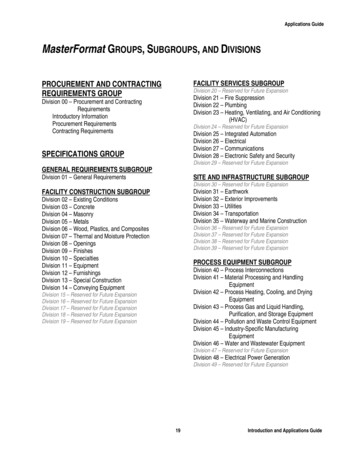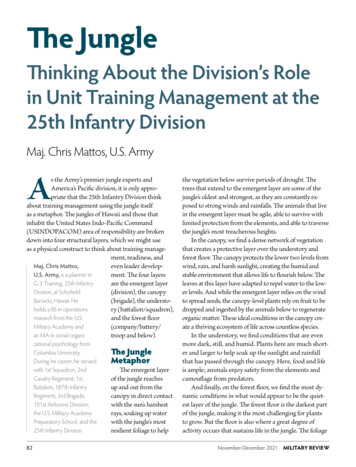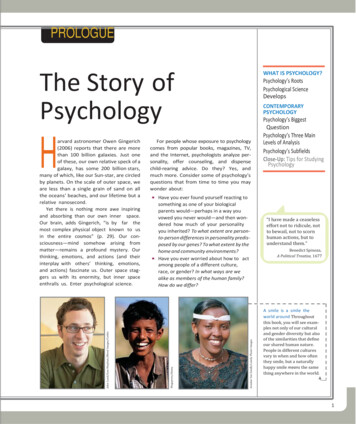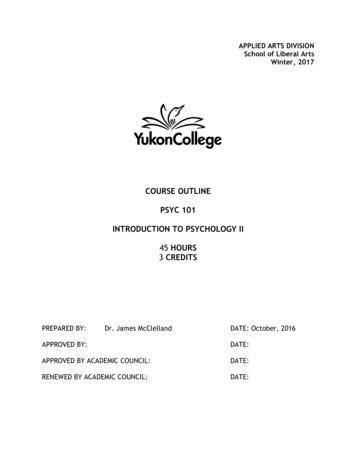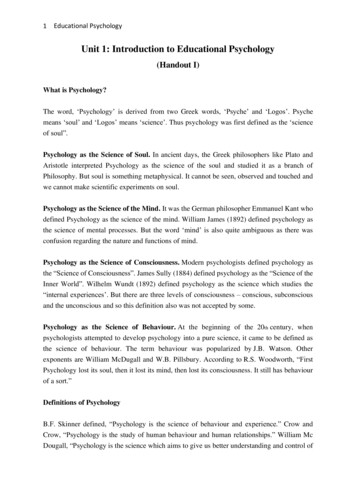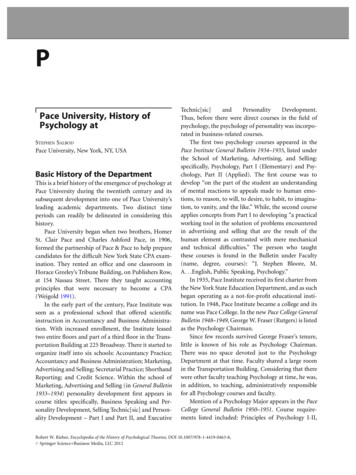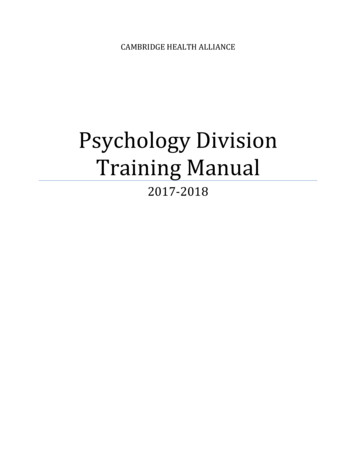
Transcription
CAMBRIDGE HEALTH ALLIANCEPsychology DivisionTraining Manual2017-2018
Psychology Division Training Manual 2017-2018Table of Contents4.Welcome Letter5.Accountable Care and the Cambridge Health Alliance5.Administrative and Technical Support6.APA Ethical Principles of Psychologists and Code of Conduct7.Biographies of Psychology Interns, Postdoctoral Fellows and PracticumTrainees in Psychology 2017-201813.Cambridge Health Alliance16.Cambridge Health Alliance EEOC Policy18.Case Presentations Outside of the Cambridge Health Alliance18.Diversity Resources for Staff and all Trainees19.Goals and Objectives of the Cambridge Health Alliance Psychology Internship19.Goals and Objectives for Postdoctoral Training at the Cambridge HealthAlliance20.Goals and Objectives for the Cambridge Health Alliance Psychology Practicum21.Graduation Criteria, Goals & Objectives for all Psychology Clinical TrainingPrograms at the Cambridge Health Alliance23.Mysell Research and Lecture Day23.National Provider Identification (NPI) Number24.Neuropsychological and Psychological Assessment (NAPA)26.Policies and Guidelines on Due Process, Remediation and Dismissal fromPsychology Training Programs2
28.Grievance Policy regarding Supervision, Caseloads, Peer Relationships andTeam Relationships29.Policies and Guidelines on Vacations30.Pregnancy and Parental Leave Guidelines31.Policies and Guidelines Regarding Precepting for Practicum Trainees, Internsand Fellows in the Adult and Child OPD (including specialty clinics and teams)32.Policies Specific to Psychology Interns on CHA Adult and Child OutpatientPsychiatry (OPD) Clinics and Teams 2017-201833.Psychology Internship Admission Criteria and Selection Procedures34.Research Postdoctoral Fellows in Psychology Seeking Supplemental ClinicalHours34.Psychology Trainee Evaluation Procedures (All Training Programs)34.Evaluations Pertaining Specifically to Psychology Interns: Introducing theClinical Portfolio36.Psychology Trainee Stipends & Health Benefits36.Sick Days and Medical Leave Guidelines38.Social Media Policies and Guidelines for all Psychology Trainees39.Supervision and Precepting in the Outpatient Department40.Supervisory Assignments and Changes in Supervision41.Psychology Division Team Page42.Working in a Medical Health Care Setting3
July 1, 2017Dear Psychology Interns, Fellows, and Practicum Trainees,Welcome to Psychology Training at the Cambridge Health Alliance! We are excited toembark upon a new training year and hope that you are excited as well.In the coming days and weeks, you will receive many streams of new information: faces,names, places, routines, roles, and responsibilities. We have created this handbook to provideyou with a reference to basic, orienting information about psychology training. It is necessarilybroad and most certainly incomplete. Nonetheless, we hope it will help create some sense ofgrounding in this initial phase of your new training year. Please note that updates to thehandbook will be made periodically and posted to the Psychology Division Team Page.We won’t be surprised if you feel overwhelmed by all that is new to learn. The clinicalwork that you are about to begin requires significant intellectual and emotional energy. Most ofus find that our curiosity about the mind/psyche, our commitment to science and service, and ourpassion for multicultural learning holds us together as an academic-clinical community. Weencourage you to make the most of your relationships with your peers, colleagues, supervisorsand teachers. Finally, we also encourage you to create space in your lives to break from yourwork: to rest, play, and rejuvenate.Best wishes for the year ahead!David G. Stewart, Ph.D.Chief of PsychologyMarla Eby, Ph.D.Director of Postdoctoral Fellowship Training ProgramAssociate Director of Psychology and Psychology TrainingPatricia Harney, Ph.D.Director of Internship Training ProgramAssociate Director of Psychology and Psychology TrainingCarolyn Conklin, Ph.D.Director of Practicum Training Program4
Accountable Care and the Cambridge Health AllianceFor many years, Massachusetts has been at the forefront of efforts to reform healthcare delivery, improve quality, and to increase access to health services.As part of this effort, the Cambridge Health Alliance is positioning itself to becomean Accountable Care Organization. As an Accountable Care Organization, the CambridgeHealth Alliance intends to be eligible to receive global payments from private, state, andfederal insurers in exchange for providing integrated care to a community of patients inaccord with the tenets of a patient centered medical home. The Psychology Division isactive in shaping the work of the ACO. As the Cambridge Health Alliance proceeds in thisdirection, the model of care delivery in some of our sites will likely include greaterintegration between Psychiatry and Primary Care. As an example, outpatient psychiatryteams may affiliate with particular primary care sites. This will allow psychology internseven greater opportunities for collaboration between mental health and medical services.As part of this new initiative, the Cambridge Health Alliance would also deliver additionalspecialty mental health services, attuned to quality, to meet in-house need. ThePsychodynamic Research Clinic (a sub-service within the Adult Outpatient Service), whichopened in September of 2009, is one model of a new care entity of this type. Psychiatryleadership has prioritized this endeavor with funding and staff resources. RISE, aprodromal psychosis clinic within the Adult OPD, is another example. Thus, Psychologyleadership and psychology training are expected to be an integral part of the AccountableCare planning process.Administrative and Technical SupportThe Division of Psychology has a full time Program Administrator of Psychology Training,Marilyn Levin. Her office is located in the 2nd Floor of the Macht Building, room 239. She isavailable to assist interns with administrative and technical questions and has theexpertise needed to direct interns to other sources within the hospital as needed.5
APA Ethical Principles of Psychologists and Code of Conductwww.apa.org/ethics/code.html6
Biographies of Psychology Interns, Postdoctoral Fellows and PracticumTrainees in Psychology 2017-2018Incoming and Continuing Psychology TraineesPracticum TraineesAdolescent Assessment Unit:Rachel Rubin is a third-year student in the Clinical Psychology PhD Program at theUniversity of Massachusetts, Boston. She previously earned a Masters Degree in ChildStudy and Human Development at Tufts University. She completed a practicum at theUMass Boston Counseling Center. Rachel has a longstanding commitment to promotingpositive youth development through work with adolescents and their families.Child Assessment Unit:Jonathan Sepulveda is a second-year student in the Counseling Psychology PhD Programat Boston College. He previously earned a Masters Degree in Mental Health Counselingfrom the City University of New York, and subsequently practiced as a mental healthcounselor. Previous clinical experience includes providing in-home individual and familytherapy with adolescents enrolled in an alternative-to- incarceration program, atEsperanza New York. Jonathan is looking forward to child training.Latino Mental Health:Marta Pagan-Ortiz is a third-year student in the Clinical Psychology PhD Program at theUniversity of Massachusetts, Boston. She previously earned a Masters Degree in CounselingPsychology from Northeastern University. Previously practica include McLean Hospital’sBehavioral Health Partial Hospital Program, and Arbour Counseling in Jamaica Plain. FromPuerto Rico, Marta is fluent in English and Spanish and is interested improving communityhealth and health disparities in Latino populations.Neuropsychological and Psychological Assessment Program:Kushnoo Indorewalla is a third-year student in the Clinical Psychology PsyD Program atWilliam James College. She previously earned a Masters Degree in Clinical Psychology atChrist University in Bangalore, India. Previous practica include the NeuropsychologicalAssessment Program at Beth Israel Deaconess Medical Center, and the school counselingprogram at West Roxbury Academy. She is fluent in English, Hindi, Gujrati and Bengali.Kushnoo would like to bring neurological assessment services back home to India, as shesays this is an area of need.7
Clinical InternsAdult OPD/Adult Acute Services:Chloe Greenbaum is a doctoral candidate in Counseling Psychology at NYU. She receivedher B.A. in Psychology cum laude from Dartmouth College. Her clinical experiences includeplacements at VA hospitals and correctional facilities. She is the recipient of theDistinguished Practitioner Award from Division 17 of APA and the Student AchievementAward from Division 53 of APA. Her dissertation examines the efficacy of expressivewriting interventions among inmate populations. This research has been funded withgrants from Dartmouth College, NYU, and the APA.Adult OPD/Adult Acute Services:Zachary Barletta is a doctoral candidate in Counseling Psychology at NYU. He received hisB.S. from Cornell University, where he received a Presidential Research Scholarship to fundhis undergraduate research. He is a Division 39 (APA) Scholar. His clinical and researchinterests are on suicidal and nonsuicidal self injury among LGBTQ youth.Adult OPD/Adult Acute Services:Sebastian Barr is a doctoral candidate in Counseling Psychology at the University ofLouisville. He received his B.A. from Smith College. He has published in the Journal ofCounseling Psychology on stress and trans identity. His dissertation examines the role oftransgender belongingness as a mediator between trans identity and well-being. Hisresearch has also been supported by the APA.Adult OPD/Adult Acute Services:David Talavera is a doctoral candidate in Clinical Psychology at the University of HoustonUP. He received his B.A. with honors from the University of California-Berkeley. He is therecipient of an APA grant on Ethnic Minority Training. His clinical and research interestsare in the area of stress and health among ethnic minorities and suicide risk among diversepatient populations. Within the Adult OPD, David will be placed on the Latino Team atWindsor Street.Adult OPD/Child OPD:Miriam Dreyer is a doctoral candidate in clinical psychology at City University of NewYork. She received her B.S. with honors in International Studies from the University ofChicago, where she was the recipient of the Adalai Stevenson Prize for Original Research.Her clinical experience includes placements at MIT Mental Health Service, as well as NYCarea high schools. Her dissertation pertains to the intergenerational transmission oftrauma between mothers and children.8
Adult OPD/Child OPD:Sarah Samuelson is a doctoral candidate in clinical psychology at the PGSP-StandfordConsortium. She received her B.S. magna cum laude in Architectural Studies from TuftsUniversity. Her clinical experience includes placements at the Departments of Child andAdolescent Psychiatry at both Kaiser Permanente Medical Center in Redwood City, CA andStanford University School of Medicine. Her dissertation pertains to the pathways fromchildhood violence to adult antisocial behavior, and she has published related articles inthe Journal of Child Abuse and Neglect.Adult OPD/Child OPD:Annemarie Baldauf is a doctoral candidate in clinical psychology at the Illinois School ofProfessional Psychology-Argosy. She received her B.A. in Psychology from DePaulUniversity and has a Diploma in Dance and Movement Therapy from Schule Regina Garcia,Tanz Und Bewegungstherapie, Switzerland. Clinical placements include experience at theHeartland Alliance Marjorie Kovler Center for the Treatment of Survivors of Torture. Herdoctoral project explores the experience of bilingual clients working in non-native Englishlanguage in psychotherapy.Adult OPD/Child OPD:Carlos Rivera is a doctoral candidate in Clinical Psychology at Suffolk University. Hereceived his B.S. summa cum laude from the University of Georgia. His clinical experiencesinclude placements at the McLean Child and Adolescent OCD Institute, Center for Anxietyand Related Disorders at Boston University. He also has several publications on the topic ofchild/adolescent OCD and depression. His dissertation examines mothers' relationalresponses to their children's anxiety. Within the Adult OPD, Carlos will be placed on theLatino Team at Windsor Street.Child OPD/Child Inpatient Assessment:Marianna Leavy-Sperounis is a doctoral candidate in Clinical Psychology at GeorgeWashington University. She received her B.A. in Politics (minors in Hispanic and Women'sStudies) from Oberlin and received her Masters in City Planning from MIT. Clinicalplacements include the Lodge School, George Washington Psychological Services, andCentro Nia, a multicultural education center for low income children and families. She is arecipient of the Division 39 scholar award and has presented at APA on culturalcompetence. Prior to graduate school in psychology, she was the Special Assistant tothe Secretary Senior Advisor for HUD under the Obama Administration.9
Postdoctoral FellowsVictims of Violence Program:Jennifer Bakalar received her BA at Cornell University, and she is a PhD candidate at theUniformed Services University of the Health Sciences. She is currently completing herinternship at the American University Counseling Center. She has also done externships atNIMH and the Walter Reed Medical Center, and has published on childhood trauma, eatingdisorders and military suicide. Her dissertation topic is: The association between childhoodadverse life event history, eating disturbance, and body mass index in active duty militarypersonnel.Psychotherapy Research Clinic-Psychological Assessment:Katherine Chase received her BA at Tufts University, her MA at Columbia UniversityTeachers College, and she is a PsyD Candidate at PGSP-Stanford University. She is currentlycompleting her internship at Massachusetts Mental Health Center/Harvard Medical School.Her psychotherapy and assessment experiences include the Palo Alto VA and the Instituteon Aging, and her research interests focus on positive coping strategies. Her dissertationtopic is: Comparative defense styles of clinical psychology graduate clinicians.Neuropsychology:Marika Faytell received her BA at Vassar College, and she is a PhD candidate at theUniversity of Houston. She is currently completing her internship at the Boston VA. Otherclinical neuropsychology experience includes the Houston Neurology Group and theInstitute for Rehabilitation and Research. She has published and presented on disabilitiesassociated with HIV and traumatic brain injury. Her dissertation topic is: Investigation ofthe interrelationships between fatigue, memory impairment, and adherence among personsliving with HIV disease.Neuropsychology:Anastasia Finch received her BA magna cum laude from Stetson University, her MA atColumbia University Teachers College, and she is a PhD candidate at the California Schoolof Professional Psychology. She is currently completing her internship at the VA Marylandin Baltimore. Other clinical experience includes the San Francisco VA, and the KaiserOakland Department of Psychiatry, with a focus on the treatment of severe mental illness.Her dissertation topic is: Defeatist beliefs as a mediator of internalized stigma, negativesymptoms and quality of life during recent onset schizophrenia.Child/Adolescent Acute ServicesRenée Marchant received her BA at Boston College, and she is a PsyD candidate at WilliamJames College. She is currently completing her internship at the UniversityNeuropsychiatric Institute, University of Utah Hospitals. Clinical experiences with childrenand adolescents include work at YOU, Inc. and the residential Chamberlain InternationalSchool. Her research has focused on emotional functioning, and she has languagecompetency in Spanish. Her dissertation topic is: Relational bullying, gender, andinterpersonal self-efficacy in young adults.10
Program for Psychotherapy:Shannon McIntyre received her BA at the University of California, Berkeley, and she is aPhD candidate at Long Island University. She is currently completing her internship at thePennsylvania Hospital/Penn Medicine in Philadelphia. Other clinical externships includethe sexual Offender Treatment Program at Bronx Children’s Psychiatric, and the Beth IsraelMedical Center. Her publications include work on therapeutic empathy and identitychanges in women, and she has been awarded a Division 39 grant for her research. Herdissertation topic is: Therapeutic states and the empathic process: Attachment, shame, fear,fantasy, personal distress and expression recognition.Program for Psychotherapy:Carrie Potter received her BA summa cum laude from Colby College, and she is a PhDcandidate at Temple University. She is currently completing her internship at thePhiladelphia VA. She has also worked at the Adult Anxiety Clinic of Temple University andthe Drexel Medicine Center City Clinic, and is the recipient of a Psychoanalytic Fellowshipfrom the Psychoanalytic Center of Philadelphia. Her publications focus on the treatment ofstress and anxiety. Her dissertation topic is: Interactive role of anxiety sensitivity and painexpectancy in dental anxiety.Adolescent Risk Assessment/Safety Net:Samantha Morin received her BA from Saint Anselm College, her MA in forensics fromRoger Williams University, and she is a PhD candidate at Fordham University. She iscurrently completing her internship at the U Mass Medical School/Worcester RecoveryCenter. She has also worked at the New York City Children’s Center and FordhamUniversity Law Clinic. Her publications focus on forensic assessment of juveniles. Herdissertation topic is: Determining treatment needs and recidivism risk of juveniles withsexual offense adjudications.Primary Care/Behavioral Health Integration:Ifigenia (Effie) Mougianis received her BA from Smith College, and she is a PhD candidateat Georgia State University. She is currently completing her internship at the I Ola LāhuiRural Hawaii Behavioral Health Program. Previous placements include the Children’sHealthcare of Atlanta, and work in Spanish at the Caminar Latino. Her writing andpresentations focus on pediatric health issues. Her dissertation topic is: Perceiveddiscrimination in adolescents with sickle cell disease: an exploratory analysis.Primary Care/Behavioral Health Integration:Anna Marie Vu received her BA from Columbia University, and she is a PhD candidate atthe University of Minnesota. She is currently completing her internship at the Madison VAMedical Center. She has also worked at the Hennepin County Medical Center and theMinneapolis VA. Her writing and presentations focus on stress management. Herdissertation topic is: Efficacy of Pacifica, a CBT and mindfulness-based mobile healthsmartphone app for stress, depression, and anxiety management with health monitoring.11
Second-year Fellows:Program for Psychotherapy: Robert Drinkwater obtained his BA at University of NorthCarolina/Chapel Hill, and expects his PhD from Oklahoma State University. His research isgrounded in terror management theory, and his dissertation examines predictors of deathanxiety in college students. He completed his internship at the counseling center atAmerican University.Adult NeuropsychologyCasey Sarapas received his BS at Fordham University withhighest honors, and will receive his PhD in at the University of Illinois, Chicago. Hisdissertation explored neurocognitive mediators of emotion regulation in panic disorder. Hecompleted his internship at the VA Maryland Health Care System/University of Maryland.12
Cambridge Health AllianceWHAT WE AREFrom our website: http://www.challiance.org/careers/careers.shtmlAn award-winning system that has been recognized nationally for community andacademic excellenceAn integrated health network that has three hospitals - Cambridge campus, Somervillecampus, and Whidden campus - and more than twenty primary care practicesA comprehensive health provider that offers a wide variety of medical, surgical, and mentalhealth programsAn academic leader that has affiliations with both Harvard Medical School and TuftsUniversity School of Medicine, as well as several schools of nursing, including BostonCollege, Simmons College, and the University of MassachusettsAn important resource that works with and within its communities to identify and addresshealth disparitiesAn employer of more than 4000 individuals from many fields who work together toprovide the best patient care and improve the health of our communitiesApplicants are considered for positions without regard to race, color, religion, sex, nationalorigin, sexual preference, age, marital status, medical condition, disability, or other legallyprotected status.Cambridge Health Alliance supports a drug free work environment.Cambridge Health Alliance Code of EthicsFrom our website: http://www.challiance.org/aboutus/ethical guidelines.shtmlIt is the policy of Cambridge Health Alliance to use consistent ethical guidelines in decisionmaking about patient care, employee relations and business practices.General PrinciplesThe best interests of our patients drive our decision-making.We are dedicated to the principle that all patients, employees, physicians and visitors willbe treated dignity, respect, and courtesy.Honest, open communication characterizes all of our interactions with patients, employees,and the community.13
We honor the diversity of our patients, staff, and community and create a culture in whichall feel valued and respected.We are committed to using a collaborative decision-making process in resolving difficultpatient care issues which involves all appropriate parties.We fairly and accurately represent ourselves and our capabilities.We provide services to meet the identified needs of our patients and do no provideunnecessary services.We continuously improve the quality of our medical care.We maintain patient confidentiality.We honor our commitments to patients, staff, and the community.We hold ourselves to the highest standards in meeting and exceeding all of our professionalstandards and legal and regulatory obligations.We continuously monitor our compliance with this code of ethics and provide training asneeded to achieve these goals.Significant Ethical Policy Issues and ExamplesPatient Care IssuesTreatment decisions are made on a case by case basis. Our care decisions are based on theclinical status of our patients and on patient/family desire.We work in partnership with our patients and, if appropriate, with their families.We share information about patient needs and preferences, diagnostic and treatmentopportunities, and the risks and alternatives to recommended courses of action.Communication with families is guided by the wishes of our patients.When unexpected consequences or errors occur which significantly impact patient wellbeing, it is our duty to inform the patient and/or family of the probable cause.We proactively develop systems to maintain patient and other information in a confidentialmanner, recognizing the special challenges created by the increasing use of electronicmethods of storing and sharing information.We provide patients and their families with multiple methods to share with us their issuesand concerns.14
All members of the health care team have independent duties to be sensitive to a patient’sneeds and desires and to report their perceptions to the physician in charge.The physician will encourage such communication.Workplace IssuesWe openly share information with our staff and keep our promises to our employees.We provide a safe workplace free from any form of discrimination or harassment.We encourage staff to share any ethical issues that arise for them by providing bothconfidential and anonymous methods to communicate their concerns.We recognize that conflicts will inevitably arise amongst those who participate in hospitaland patient care decisions.We seek to resolve all conflicts fairly and objectively.Business PracticesWe provide inpatient and outpatient services to persons regardless of their ability to pay orimmigration status.Decisions to divert or transfer a patient to another facility are made only upon patientrequest or when the patient’s specific disease or condition cannot be safely treated at ourfacility.Discharge decisions are based on the patient’s medical condition and readiness fordischarge. We work to ensure that patients are treated at the most appropriate level ofcare.We maintain a compliance program designed to establish a culture that promotesprevention, detection and resolution of instances of conduct which do not conform tofederal, state, and private health care program requirements.We welcome patient or other payer questions about charges, Questions will be discussedand conflicts resolved without real or perceived harassment, using a fair and formalprocess.As part of our process, we will disclose any potential conflicts of interest and takeappropriate actions to assure integrity.We review all marketing materials to ensure that our organization, services, and policiesand procedures are stated to out community and patients accurately, clearly, and in aculturally appropriate manner.15
Cambridge Health Alliance EEOC PolicyPolicy Number: A-HRS-0026Effective Date: April 8, 2009Date Original Version of Policy was Effective: August 1, 2008Date of Most Recent Review/Revision to the Policy: April 8, 2009I. Purpose:The purpose of this policy is to ensure Cambridge Health Alliance provides equalemployment opportunities to all employees and applicants for employment without regardto race, color, religion, gender, sexual orientation, national origin, age, disability, maritalstatus, or status as a covered veteran in accordance with applicable federal, state and locallaws.II. Personnel:This policy applies to all employees, candidates for employment, volunteers, andcandidates for volunteer, interns and intern candidates, students or student candidates ofthe Cambridge Health Alliance.III. Policy:Cambridge Health Alliance expressly prohibits any form of unlawful employee harassmentbased on race, color, religion, gender, sexual orientation, national origin, age, disability, orveteran status. Improper interference with the ability of an employee to perform his/herstated job duties is expressly prohibited. Cambridge Health Alliance believes that thediversity of socioeconomic, racial, ethnic, cultural, religious, gender, gender orientation, ageand disability backgrounds of its employees and patients enriches the CHA communityIV. Procedures:Cambridge Health Alliance complies with applicable federal, state and local laws governingnondiscrimination in employment, in every location of our organization. This policy appliesto all terms and conditions of employment, including, but not limited to, hiring, placement,promotion, termination, layoff, recall, transfer, leaves of absence, compensation, andtraining.A. In addition Cambridge Health Alliance will:1. Take affirmative action to ensure that employment practices are free of discriminationincluding, but not limited to, hiring, upgrading, transfer, recruitment, recruitmentadvertising, selection, layoff, disciplinary action, termination, adverse employmentaction, rates of pay or other forms of compensation and selection for training.2. Prohibit the harassment of any employee or job applicant on the basis of race, color,religion, gender, sexual orientation, national origin, age, disability, or veteran status.3. Commit the necessary resources, both financial and others to achieve the goals ofequal employment opportunity (EEO).16
4. Evaluate the performance of executive, management and supervisory staff on the basis oftheir involvement in achieving these objectives as well as other established criteria.5. Monitor all EEO activities and report on the effectiveness of the activities.B. All applicants will be informed that CHA is operating under an EEOC plan that providesequal opportunities to qualified employees without regard to race, color, religion, sex, age,national origin, veteran status, or physical or mental disability or other protectedcharacteristic. This information will be made known to applicants at the CHA on-lineapplicant process and at the employment office of the Human Resources Department byposting a copy of the CHA EEO policy statement.C. Managers and supervisors of CHA will ensure that hiring and promotion decisions are inaccordance with principles of equal employment opportunity.D. CHA will reasonably accommodate the religious observances and practices of anemployee unless such accommodation creates an undue hardship on the conduct of thebusiness.E. Employees or applicants are protected from coercion, intimidation, interference, ordiscrimination for filing a complaint or assisting in an investigation under the lawscovering these individuals. Periodic reviews will ensure that personnel decisions are in fullaccord with the principles and spirit of equal employment opportunity law.F. Complaint Resolution ProceduresAny person who believes he or she may have been discriminated against in violation ofthese principles or who observes any discrimination in violation of these principles maydiscuss the matter with a human resources representative.G. False AccusationsCHA also recognizes that the question of whether a particular course of conduct constitutesdiscrimination or harassment often requires a factual determination, and that falseaccusations can have a serious detrimental effect on innocent persons. Therefore, if aninvestigation results in a finding that a person accused another of discrimination orharassment maliciously or recklessly, or the complaining employee made false accusations,that employee
Psychology Trainee Evaluation Procedures (All Training Programs) 34. Evaluations Pertaining Specifically to Psychology Interns: Introducing the Clinical Portfolio . Distinguished Practitioner Award from Division 17 of APA and the Student Achievement Award from Division 53 of APA. Her dissertation examines the efficacy of expressive
